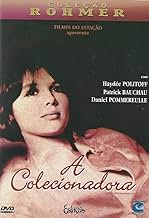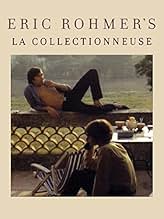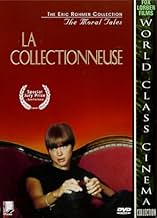IMDb रेटिंग
7.3/10
10 हज़ार
आपकी रेटिंग
अपनी भाषा में प्लॉट जोड़ेंA womanizing art dealer and a painter find the serenity of their Riviera vacation disturbed by a third guest, a vivacious bohemian woman known for her long list of male conquests.A womanizing art dealer and a painter find the serenity of their Riviera vacation disturbed by a third guest, a vivacious bohemian woman known for her long list of male conquests.A womanizing art dealer and a painter find the serenity of their Riviera vacation disturbed by a third guest, a vivacious bohemian woman known for her long list of male conquests.
- पुरस्कार
- 2 जीत और कुल 1 नामांकन
Mijanou Bardot
- Carole
- (as Mijanou)
Eugene Archer
- Sam
- (बिना क्रेडिट के)
Brian Belshaw
- Haydée's boyfriend
- (बिना क्रेडिट के)
Pierre-Richard Bré
- Homme dans l'auto
- (बिना क्रेडिट के)
Donald Cammell
- Garçon à St-Tropez
- (बिना क्रेडिट के)
Alfred de Graff
- Touriste perdu
- (बिना क्रेडिट के)
फ़ीचर्ड समीक्षाएं
In The Collector, the first feature-length film of the Six Moral Tales series, mind-games, strategies, and overt manipulation thwart the possibility of satisfying relationships. The 54-minute film is beautifully photographed and has an elegance, charm, and wit that bears favorable comparison with his more acclaimed works. Adrien (Patrick Bauchau), an art dealer, and Daniel (Daniel Pommereulle), a painter spend the summer in a house on the French Riviera. Also vacationing there is Haydee (Haydee Politoff), an elegant but rather aloof young woman who sleeps with many boys in the area and has earned the title of "collectionneuse", a collector of men. Adrien, smug and self-centered in a charming sort of way, is interested in Haydee but tells himself that her promiscuity is a trick for him to seduce her and he refuses.
The summer turns into a love triangle with Adrien convincing Daniel to pursue Haydee to ease the pressure of his own conflict between his rationalizing intellect and his passions. In the moral scheme of things, Haydee may represent the sexual revolution of the 60s and Adrien that of traditional morality, yet the film takes no sides, presenting the issues without judging the characters and giving us much to think about. The Collector is perhaps the most philosophical of the six but in the end the pursuit without passion leads to a feeling of emptiness and missed opportunities. Like most of Rohmer's films, there are no peak dramatic moments or confrontations, just everyday life elevated into art.
The summer turns into a love triangle with Adrien convincing Daniel to pursue Haydee to ease the pressure of his own conflict between his rationalizing intellect and his passions. In the moral scheme of things, Haydee may represent the sexual revolution of the 60s and Adrien that of traditional morality, yet the film takes no sides, presenting the issues without judging the characters and giving us much to think about. The Collector is perhaps the most philosophical of the six but in the end the pursuit without passion leads to a feeling of emptiness and missed opportunities. Like most of Rohmer's films, there are no peak dramatic moments or confrontations, just everyday life elevated into art.
10totius
It's hard to explain what is the Rohmer's cinema. In his movies you can't find heroes, incredible adventures or great action sequences. Everything happens inside the mind of the characters, and the most important aspect is the psychology of them.
La Collectioneuse is simply the masterpiece of Rohmer.
The plot is very simple: two boys and one girl in their friend's house in St.Tropez. That's all. There are not incredible events that happen, they simply LIVE there. It's an typical situation of Rohmer who likes to study the evolution of love triangles, in different situations. The explanation of the development steps, made by the usual interior voice of the main character (Adrien), it's incredibly accurate and likely. It's fantastic that sometimes Adrien's thoughts look at first to be absurd, but even in this case if we reflect a bit to that we can realize that it's true, that really in similar cases we have non-sense thoughts like those. In this way, Rohmer is unique: the psycho-evolution of the characters is incredibly real. Dialogs, internal and not, are superb and the directing essential.
Rohmer shows us how it's possible to make a masterpiece with a ridiculous budget, and how an intellectual movie can be also enjoyable and not so heavy.
The vote, of course, can't be different by 10 out of 10.
La Collectioneuse is simply the masterpiece of Rohmer.
The plot is very simple: two boys and one girl in their friend's house in St.Tropez. That's all. There are not incredible events that happen, they simply LIVE there. It's an typical situation of Rohmer who likes to study the evolution of love triangles, in different situations. The explanation of the development steps, made by the usual interior voice of the main character (Adrien), it's incredibly accurate and likely. It's fantastic that sometimes Adrien's thoughts look at first to be absurd, but even in this case if we reflect a bit to that we can realize that it's true, that really in similar cases we have non-sense thoughts like those. In this way, Rohmer is unique: the psycho-evolution of the characters is incredibly real. Dialogs, internal and not, are superb and the directing essential.
Rohmer shows us how it's possible to make a masterpiece with a ridiculous budget, and how an intellectual movie can be also enjoyable and not so heavy.
The vote, of course, can't be different by 10 out of 10.
Eric Rohmer's movies are, it seems almost without exception, slow- burners that reward those with the patience to sit through them, preferably more than once in some cases, and think about whats being said as much as whats being shown. This, his first feature in colour requires considerable thought on the part of the viewer, serving up nothing in the way of dramatic excitement and featuring three loathsome main characters who's morals are very in keeping with the era of late- 60s self satisfaction and hedonistic excess. Not that the hedonism is very wild. Jimi Hendrix does not blast from the simple record player that sits near a chair and provides the only music in the film. No one smokes anything illegal or pops any pills, talks of Indian mystics or goes in for meditation. But there is the very liberated (nowadays we'd say reckless) attitude to casual sex, although we don't see very much; the relaxed tangle of naked legs half glimpsed through one doorway, a brief an unrevealing shot of the main protagonist, the disturbingly young looking Haydee, quietly enjoying the intimate attention of another one-night-stand. Otherwise it's all hints and the more effective for that. Haydee is the very image of a swinging-sixties bed hopper. Young, slender, independent, cool and seemingly amoral she wrecks the plans of Adrian, an art dealer with time on his hands, when he finds her resident in a borrowed holiday villa at which he intends to devote himself to doing nothing at all for a few weeks while his girlfriend is in London. Haydee's noisy night-time frolics disturb his sleep and offend his self- declared sense of morality and the added presence in the house of his lazy, grumpy painter-friend Daniel sets up a spiralling tension between them all. But this is pure Rohmer and that tension manifests itself not in fist-fights, broken furniture, tearful confessions and blood-letting, but insults, low-key/nigh-brow arguments, teasing, sniping and political manoeuvring. In fact the more one thinks about the film, and it's one of those movies that does hang around long after the credits, the more one realises it's actually rather more like real-life, certainly as most of us endure it from time to time, than the over-dramatic offerings we are used to from mainstream movie-makers. Haydee maybe cute, Adrien describes himself as handsome and the setting is idyllic but you really wouldn't like to be on holiday with these unsympathetic characters. Observing their antics from without is one thing but to be part of it would be a nightmare! Oddly with it's morality so perfectly fixed in it's own time, this seems far more like a film from the 1970s. Something in it's look and after-the-party sense of deflation and disenchantment fits in with that later decade. Seeing it without knowing the release date you might well guess at 1972 or even later. If Godard's BANDE A PARTE is set in a Swinging-Sixties that hasn't yet arrived, Rohmer's film portrays one that has already left the building, although it's after-effects continue to create a problem. It all sounds somewhat depressing on paper and to some extent it is! It's not an easy film but if you give it time and maybe second look, you might well find there is more to this outwardly simple tale than you thought.
The first feature length moral tale, La Collectionneuse is easily better than its predecessors. Offering a realistic look into the lives of three young people and narrated perfectly by one, La Collectionneuse is a beautiful film. This is Eric Rohmer's first color feature and it is absolutely magnificent to look at. There are several gorgeous beach scenes. The cinematography all around is just glorious. Aside from that, the acting is wonderful. There is so much chemistry between the main characters that it electrifies the film. It also provides a realistic tale of the struggle to keep morality. Translated as "The Collector" in English, La Collectionneuse is an overlooked, underrated film that should be considered a classic.
The story begins with three prologues. The first, Haydee's prologue, simply shows the girl on the beach in a skimpy bikini. The second prologue introduces the viewer to Daniel, a painter, who becomes a key character. Adrien's prologue, the third and last, gives us an introduction to Adrien, who becomes our narrator throughout the rest of the film. These three characters are whom the story revolves around. Sharing a mutual friend, the three of them come to share a villa during their vacation. Adrien, an art dealer who is played by Patrick Bauchau, has made it his goal to do absolutely nothing during his stay. He and Daniel (Daniel Pommereulle) become friends fairly quickly, but both keep their distance from Haydee (Haydee Politoff), the beautiful young girl who beds a different guy every night. Adrien is at first disgusted with her behavior, calling her a "collector" of men, but eventually becomes intrigued by her. As he grows more and more attracted to her, Adrien must decide whether or not to sleep with her and forget his moral integrity or to abstain and do what he knows is right. Through his narration, Adrien debates this and plays mind games with Haydee, although he's not sure if she shares the attraction or if she simply wants to add him to her collection.
This film is simply beautiful. The sexual tension feels very real, which is due to both the performances of the actors and the direction of Eric Rohmer, who is quickly becoming one of my favorite directors. The narration is refreshing, offering a good look into Adrien's mind. La Collectionneuse is very sharp with its dialogue and themes. Like the other Rohmer films I've seen, this one ends very abruptly. It reminds us that we're watching these people's lives for only a short time. The 87 minutes is completely worth it, though. La Collectionneuse is a great film and should be regarded in higher esteem than it seems to be. I can't imagine why this one isn't ranked alongside the greats.
10/10
The story begins with three prologues. The first, Haydee's prologue, simply shows the girl on the beach in a skimpy bikini. The second prologue introduces the viewer to Daniel, a painter, who becomes a key character. Adrien's prologue, the third and last, gives us an introduction to Adrien, who becomes our narrator throughout the rest of the film. These three characters are whom the story revolves around. Sharing a mutual friend, the three of them come to share a villa during their vacation. Adrien, an art dealer who is played by Patrick Bauchau, has made it his goal to do absolutely nothing during his stay. He and Daniel (Daniel Pommereulle) become friends fairly quickly, but both keep their distance from Haydee (Haydee Politoff), the beautiful young girl who beds a different guy every night. Adrien is at first disgusted with her behavior, calling her a "collector" of men, but eventually becomes intrigued by her. As he grows more and more attracted to her, Adrien must decide whether or not to sleep with her and forget his moral integrity or to abstain and do what he knows is right. Through his narration, Adrien debates this and plays mind games with Haydee, although he's not sure if she shares the attraction or if she simply wants to add him to her collection.
This film is simply beautiful. The sexual tension feels very real, which is due to both the performances of the actors and the direction of Eric Rohmer, who is quickly becoming one of my favorite directors. The narration is refreshing, offering a good look into Adrien's mind. La Collectionneuse is very sharp with its dialogue and themes. Like the other Rohmer films I've seen, this one ends very abruptly. It reminds us that we're watching these people's lives for only a short time. The 87 minutes is completely worth it, though. La Collectionneuse is a great film and should be regarded in higher esteem than it seems to be. I can't imagine why this one isn't ranked alongside the greats.
10/10
Art dealer, in need of serenity, finds that the holiday villa is shared by a hedonistic young woman. He becomes obsessed with ignoring her and pretends to himself that she wants to seduce him while he remains unaffected. The holiday thus turns into a love triangle between the indifferent but flirtatious girl, the man's unacknowledged desire, and his incessant, pompous self-rationalizations (the best cinematic use of voice-over EVER!). A sunny, witty, and deeply ironic "moral tale" that explores, like most of Rohmer's work, the uneasy vacillation between intellect and eroticism.
क्या आपको पता है
- ट्रिवियाÉric Rohmer's first color film.
- कनेक्शनFeatured in Uuden aallon jäljillä (2009)
टॉप पसंद
रेटिंग देने के लिए साइन-इन करें और वैयक्तिकृत सुझावों के लिए वॉचलिस्ट करें
- How long is The Collector?Alexa द्वारा संचालित
- What are the names of all six of Rohmer's moral tales?
विवरण
- रिलीज़ की तारीख़
- कंट्री ऑफ़ ओरिजिन
- आधिकारिक साइट
- भाषाएं
- इस रूप में भी जाना जाता है
- The Collector
- फ़िल्माने की जगहें
- Côte d'Azur, फ़्रांस(coastal line and landscapes)
- उत्पादन कंपनियां
- IMDbPro पर और कंपनी क्रेडिट देखें
बॉक्स ऑफ़िस
- दुनिया भर में सकल
- $7,077
- चलने की अवधि1 घंटा 26 मिनट
- ध्वनि मिश्रण
- पक्ष अनुपात
- 1.37 : 1
इस पेज में योगदान दें
किसी बदलाव का सुझाव दें या अनुपलब्ध कॉन्टेंट जोड़ें


![Bande-annonce [OV] देखें](https://m.media-amazon.com/images/M/MV5BMjA2ZGRjY2QtNmMzMy00MjE3LWI1YzUtZTZiZDQ5YzY0YWIxXkEyXkFqcGdeQXRyYW5zY29kZS13b3JrZmxvdw@@._V1_QL75_UX500_CR0)













